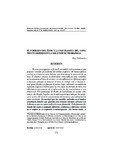El Formato del Ítem y la Naturaleza del Constructo Medido en la Solución de Problemas

View/
Date
2017-01Author
Palabras Clave
Formato del ítem, Cognitivo, Metacognitivo, Motivación, VoliciónItemformat, Cognitive, Metacognitive, Motivation, Volition
Metadata
Show full item recordAbstract
En esta investigación se formuló un modelo teórico tentativo que
propone variables procedentes del ámbito cognitivo, del metacognitivo
y relativas a la tarea como factores que determinan la ejecución de un
ítem. El objetivo consiste en determinar cómo infl uyen estas variables
en la respuesta al ítem de un test y si esta infl uencia es diferente según
el formato utilizado al plantear el ítem. Se trabajó con el modelo lineal
generalizado con función de enlace logit, utilizando un modelo de
regresión logística binaria para los tres tipos de formato de ítem, con
información proveniente de la aplicación de dos cuestionarios a una
muestra de 476 estudiantes de 4º año de bachillerato de centros educativos
del Estado Trujillo y de la información aportada por los profesores
acerca del nivel de conocimiento declarativo y procedimental de
cada estudiante. Se concluyó que las variables incluidas en el modelo
constituyen factores que guardan una relación bastante estrecha con
la forma en que un sujeto realiza la tarea planteada. Cada formato demanda
del sujeto examinado diferentes conductas o diferentes niveles
en el empleo de su cognición o metacognición. Del mismo modo, la
percepción sobre la tarea demandada es diferente según el formato en
que se presenta la misma.
Collections
Información Adicional
| Otros Títulos | The Format of Item and the Nature of Constructo in Solving Problems |
| ISSN | 1316-7790 |
| ISSN Electrónico | 2244-8454 |
| Resumen en otro Idioma | In this research, a tentative theoretical model was formulated that proposes variables from the cognitive, metacognitive and taskrelated as factors that determine the execution of an item. The objective is to determine how these variables infl uence the response to the item of a test and if this infl uence is different according to the format used when raising the item. The generalized linear model with logit link function was used, using a binary logistic regression model for the three types of item format, with information from the application of two questionnaires to a sample of 476 students of 4th year of high school in Trujillo state educational institutions and the information provided by teachers about the level of declarative and procedural knowledge of each student. It was concluded that the variables included in the model are factors that have a fairly close relationship with the way a subject performs the task. Each format demands from the examined subjects different behaviors or different levels in the use of their cognition or metacognition. In the same way, the perception about the task demanded is different according to the format in which it is presented. |
| Colación | 151-175 |
| Periodicidad | Semestral |
| País | Venezuela |
| Publicación Electrónica | Agora Trujillo |
| Sección | Agora Trujillo: Presentación |





